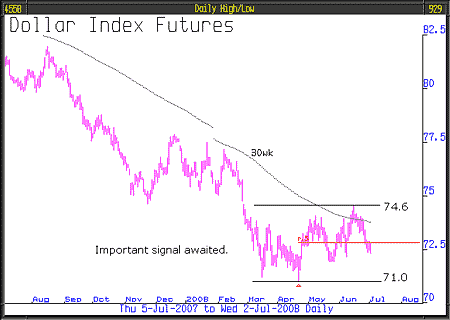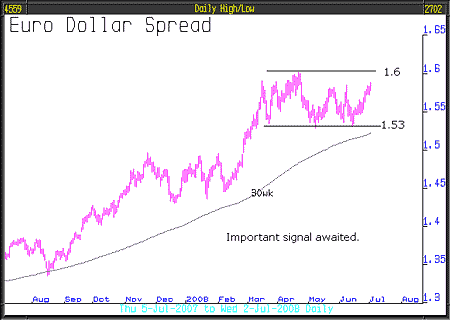Get the latest financial news, insights and expert analysis from our award-winning MoneyWeek team, to help you understand what really matters when it comes to your finances.
You are now subscribed
Your newsletter sign-up was successful
Want to add more newsletters?

Twice daily
MoneyWeek
Get the latest financial news, insights and expert analysis from our award-winning MoneyWeek team, to help you understand what really matters when it comes to your finances.

Four times a week
Look After My Bills
Sign up to our free money-saving newsletter, filled with the latest news and expert advice to help you find the best tips and deals for managing your bills. Start saving today!
In spite of widespread expectations that the dollar would revive, so far it has not. If the oil price and the gold price are anything to go by, recent strength of both is indicative of future dollar weakness.
As we have explained on many occasions before, one of the best technical signals is when a break-out occurs from an established range. Charts that develop into ranges offer the potential investor a low risk and reliable signal. The one-year chart for the dollar index has clearly been in such a range since March. The price action for the dollar index these last four days has been below the half-way level of that trading range. A reversal of the dollar's fortunes cannot take place unless that trading range is exceeded to the upside. A break below the low of the trading range would be a disastrous message and would cause dollar selling to accelerate. Anyone who is long dollar should consider the low of the trading range as their stop loss and sell dollars on weakness. Anyone who is short dollar should consider the high of the range as the stop loss to purchase dollars on strength. The eventual resolution of this range will unquestionably take place but the unknown factor is when so we patiently watch and wait.

The euro/dollar chart is also in a trading range. The two key levels are 1.6 and 1.53. One of the key drivers here is interest rate differentials. The ECB confirmed their anti-inflation fight by raising rates 0.25% to 4.25%. We don't believe the Fed, in spite of their rhetoric, are close to tightening. In the final analysis, America, as a result of the Great Depression a period of deflation - are more concerned about deflation than inflation. The ECB, because of the German influence and the great inflation they had at the time of the Weimar Republic, have a pre-disposition to fight inflation. Above 1.6 the euro should enjoy a very hot streak against the dollar.
MoneyWeek
Subscribe to MoneyWeek today and get your first six magazine issues absolutely FREE

Sign up to Money Morning
Don't miss the latest investment and personal finances news, market analysis, plus money-saving tips with our free twice-daily newsletter
Don't miss the latest investment and personal finances news, market analysis, plus money-saving tips with our free twice-daily newsletter

The news about the UK economy could not be worse; we can't believe that the Bank of England will, given the conditions, increase UK interest rates. We therefore expect pound sterling, except against the US dollar, to be very weak, particularly against the euro.
We regularly talk about the dollar-pegged currencies; inflation in these nations is truly an issue. The cost of food and energy is a much greater proportion of disposable income than is the case in the west. These nations seem happy enough to lose money by investing their deteriorating dollars in western banks, so they might just as well bite the bullet and deal with their inflation problem by allowing their currencies to float higher and to hell with their dollar-denominated reserves! We don't doubt they will eventually do this because they cannot allow the cost of food and energy to continue to rise on the back of a deteriorating US dollar or they will face a revolt.
By John Robson & Andrew Selsby at Full Circle Asset Management, as published in the threesixty Newsletter
Get the latest financial news, insights and expert analysis from our award-winning MoneyWeek team, to help you understand what really matters when it comes to your finances.
MoneyWeek is written by a team of experienced and award-winning journalists, plus expert columnists. As well as daily digital news and features, MoneyWeek also publishes a weekly magazine, covering investing and personal finance. From share tips, pensions, gold to practical investment tips - we provide a round-up to help you make money and keep it.
-
 Inheritance tax investigations net HMRC an extra £246m from bereaved families
Inheritance tax investigations net HMRC an extra £246m from bereaved familiesHMRC embarked on almost 4,000 probes into unpaid inheritance tax in the year to last April, new figures show, in an increasingly tough crackdown on families it thinks have tried to evade their full bill
-
 Average UK house price reaches £300,000 for first time, Halifax says
Average UK house price reaches £300,000 for first time, Halifax saysWhile the average house price has topped £300k, regional disparities still remain, Halifax finds.

